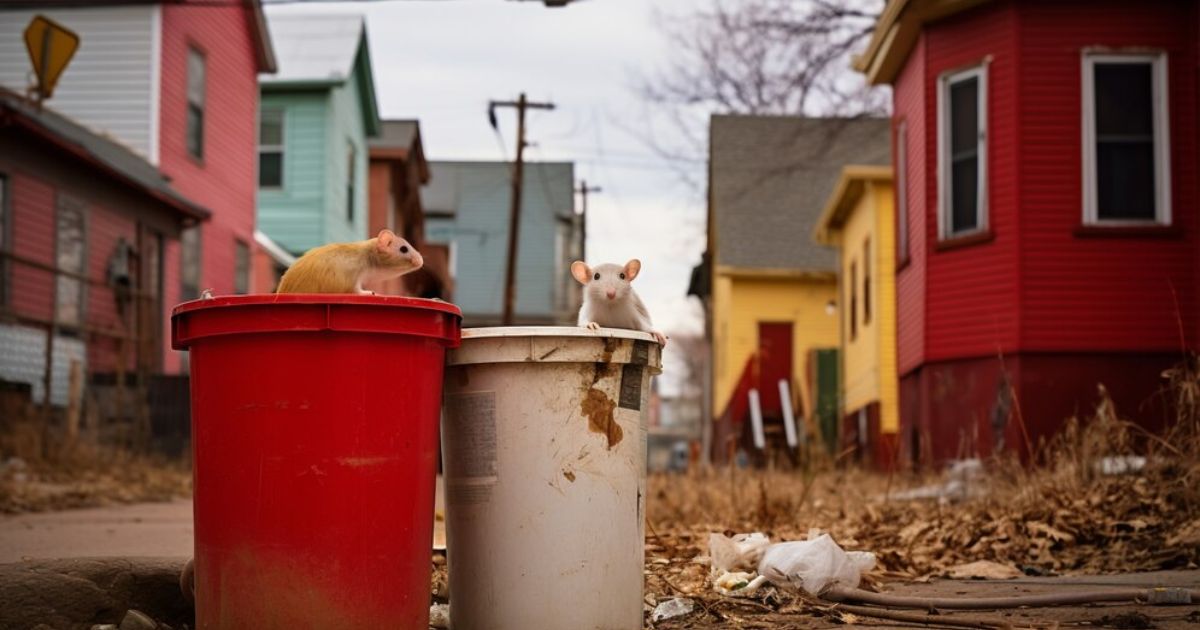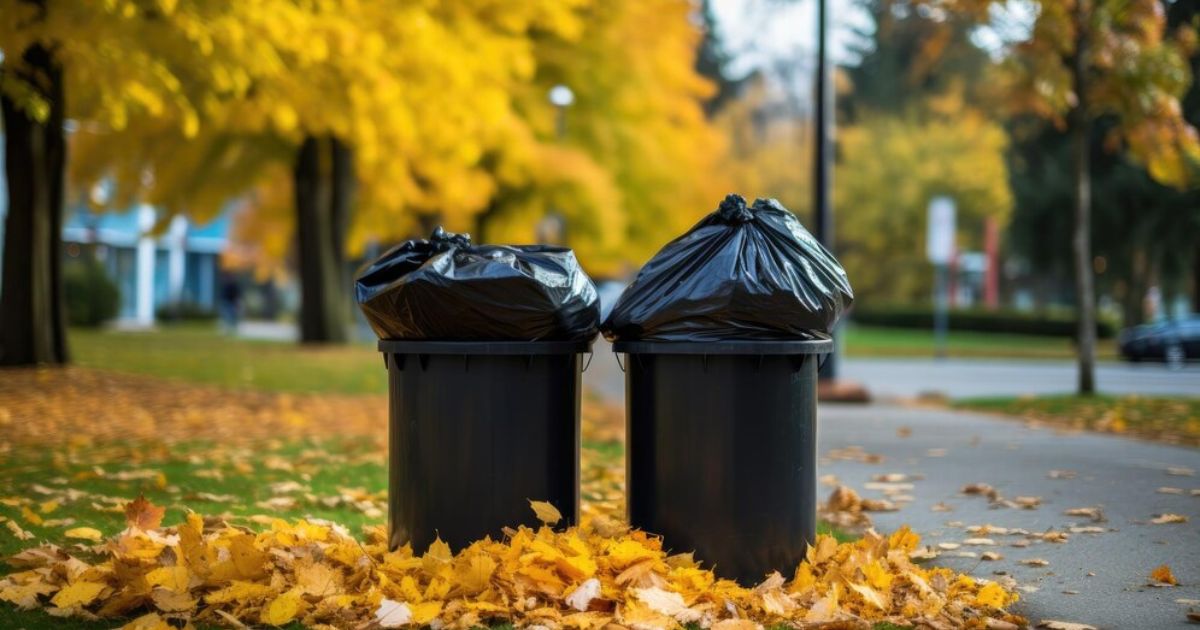Do you ever wonder how long you can leave your trash cans on the street? It’s a question that many of us have pondered, but the answer may not be as straightforward as you think. In this article, we’ll explore the importance of knowing the rules and regulations surrounding trash can placement in various settings. From residential neighborhoods to commercial districts, rural areas to suburban communities, we’ll cover it all. So, let’s dive in and discover the ins and outs of properly maintaining your trash cans.
Key Takeaways
- Knowing the rules for trash can placement and collection is important to avoid fines and maintain a clean neighborhood.
- Different areas have their own waste disposal methods and guidelines, so it is important to familiarize yourself with the regulations in your specific locality.
- Trash cans should be placed on the curb, at least three feet apart, and not obstructing the sidewalk or street. Lids should be tightly closed to prevent spillage or odor.
- In commercial and business districts, specific rules regarding time limits for leaving trash cans on the street must be followed to maintain cleanliness and avoid fines or penalties.
Importance of Knowing the Rules
Knowing the rules regarding how long you can leave trash cans on the street is crucial for avoiding fines and maintaining a clean neighborhood. Local ordinances play a significant role in waste management, ensuring that the streets remain tidy and free from potential hazards. These regulations are in place to promote a sense of belonging and community pride among residents.
By adhering to the guidelines set forth by local authorities, you contribute to the overall cleanliness and aesthetics of your neighborhood. It also helps in preventing the spread of diseases and pests that may be attracted to improperly disposed of trash. Understanding these rules will help you avoid penalties and foster a pleasant living environment for everyone. Now, let’s delve into the details of local regulations and guidelines that govern trash can placement and collection.
Local Regulations and Guidelines
To ensure compliance with local regulations and guidelines, it is important for you to understand the specific rules regarding trash can placement and collection in your neighborhood. Residential waste management is a crucial aspect of maintaining a clean and healthy environment. Different areas may have their own waste disposal methods and guidelines, so it is essential to familiarize yourself with the regulations in your specific locality.
Some neighborhoods may require trash cans to be placed on the street only on designated collection days, while others may have specific guidelines for the size and type of containers allowed. Understanding and adhering to these rules not only promotes a sense of belonging within your community, but also ensures efficient and effective waste management practices. Now, let’s delve into the next section about residential neighborhood policies.
Residential Neighborhood Policies
When it comes to residential neighborhood policies regarding trash cans, there are a few key points to consider. First, understanding the rules for trash can placement is important to ensure compliance with local regulations. Additionally, being aware of collection day rules is crucial to avoid any fines or penalties. Lastly, participating in neighborhood clean-up initiatives can help maintain a clean and attractive community environment.
Trash Can Placement
You should place your trash cans in accordance with the residential neighborhood policies regarding trash can placement. Proper placement of your trash cans not only ensures a clean and organized neighborhood but also contributes to effective waste management and trash can maintenance. Here are some guidelines to follow:
- Position your trash cans on the curb, not obstructing the sidewalk or street.
- Place your cans at least three feet apart from each other to allow easy access for waste collectors.
- Avoid placing your cans near fire hydrants, mailboxes, or other objects that may hinder collection.
- Make sure the lids of your trash cans are tightly closed to prevent any spillage or odor.
- Return your empty cans to your property within 24 hours after collection day.
Collection Day Rules
Follow these collection day rules to ensure compliance with residential neighborhood policies. It is important to be aware of the designated collection days for your neighborhood. Check with your local waste management department or homeowners association for specific information. Collection day reminders are often provided through mailings, online resources, or signs posted in the community.
On collection days, make sure to place your trash cans at the designated pick-up location, typically at the curb or alley. Remember to use proper disposal methods, separating recyclables from regular waste. Bag your trash securely to prevent littering and to keep pests away. By following these guidelines, you contribute to maintaining a clean and organized neighborhood. Speaking of neighborhood cleanliness, let’s now explore the topic of neighborhood clean-up initiatives.
Neighborhood Clean-Up Initiatives
To comply with residential neighborhood policies, ensure that trash cans are not left on the street for an extended period of time. Neighborhood clean-up initiatives play a crucial role in maintaining the beauty and harmony of our community. By actively engaging in these initiatives, you contribute not only to the cleanliness of your neighborhood but also to a sense of belonging and pride among residents. Here are five ways in which neighborhood clean-up initiatives promote neighborhood beautification and community engagement:
- Regular community clean-up days where everyone comes together to pick up litter and maintain common areas.
- Neighborhood gardening projects where residents collaborate to plant flowers, trees, and maintain green spaces.
- Organized recycling drives to encourage proper waste disposal and reduce environmental impact.
- Graffiti removal programs to keep our streets clean and free from vandalism.
- Community-led initiatives to address specific neighborhood beautification projects, such as painting murals or renovating public spaces.
Commercial and Business District Rules
When it comes to commercial and business districts, there are specific rules regarding the time limits for leaving trash cans on the street. These rules often vary depending on the city and local regulations. It is important for businesses to be aware of these rules and ensure that they comply with them to avoid any potential fines or penalties associated with acceptable for outdoor trash storage.
Time Limits for Businesses
Businesses in commercial and business districts must adhere to specific time limits when leaving trash cans on the street. These regulations aim to maintain cleanliness and ensure efficient waste disposal in these busy areas. Here are some important points to consider:
- Trash cans should be placed on the street no earlier than the designated time specified by local authorities.
- Businesses must remove their trash cans from the street by a certain time to prevent obstruction and maintain a clean appearance.
- Failure to comply with these time limits may result in fines or penalties.
- Regular inspections are conducted to ensure businesses are following these regulations.
- Cooperation from all businesses is crucial to maintain a clean and welcoming environment for all.
Trash Can Placement
When placing trash cans in commercial and business districts, it is important to adhere to specific rules and regulations to ensure a clean and orderly environment. Proper trash can placement contributes to effective waste management and helps maintain a positive image for businesses. Below is a table outlining some key guidelines for trash can placement in commercial and business districts:
| Rule | Description |
|---|---|
| Distance from doors | Trash cans should be placed at least 10 feet away from any entrances |
| Accessibility | Ensure that trash cans are easily accessible for collection |
| Clear walkways | Keep trash cans away from sidewalks and pedestrian walkways |
| Aesthetics | Use trash can enclosures or decorative covers for a pleasing look |
| Regular maintenance | Regularly clean and maintain trash cans to prevent odor and pests |
Enforcement of Rules
To ensure compliance with commercial and business district rules, you must be aware of how long trash cans can be left on the street. The importance of enforcement cannot be overstated, as it ensures a clean and orderly environment for businesses and customers alike. Here are some key points to consider:
- Regular inspections: Local authorities conduct regular inspections to ensure that businesses are adhering to the rules regarding trash can placement and removal.
- Fines and penalties: Non-compliance can result in fines and penalties, which can be a significant financial burden for businesses.
- Public image: Businesses that fail to comply with trash can regulations risk damaging their public image and reputation.
- Neat and inviting appearance: Enforcing the rules promotes a neat and inviting appearance of commercial and business districts, which is crucial for attracting customers.
- Community pride: Compliance with rules fosters a sense of community pride and belonging.
Rural Areas and Suburban Communities
In rural areas and suburban communities, you can typically leave your trash cans on the street for up to three days. This allowance is based on the specific regulations set by local waste management authorities. In these areas, waste management is often organized on a weekly or bi-weekly basis, which means that residents are expected to place their trash cans out on the street for collection on designated days.
However, it is important to note that leaving your trash cans out for an extended period can lead to issues such as pests, odors, or even violation of local ordinances. To maintain a clean and orderly neighborhood, it is recommended to adhere to the designated collection schedule and promptly remove your trash cans once they have been emptied.
Public Health and Sanitation Concerns
Leaving trash cans on the street for extended periods can lead to several public health and sanitation concerns. One major issue is the potential for trash can overflow, which can attract pests and rodents. These pests can spread diseases and create unsanitary conditions in the surrounding area. It is important to address these concerns promptly to maintain a clean and healthy environment for everyone.
Trash Can Overflow
You should be aware of the potential public health and sanitation concerns that can arise from trash can overflow. When trash cans are not properly maintained or waste management practices are lacking, the following issues can occur:
- Pungent odors can permeate the air, making it unpleasant for residents and visitors alike.
- Rodents and pests are attracted to the overflowing trash, increasing the risk of disease transmission.
- Trash can attract flies and other insects, further contributing to unsanitary conditions.
- Overflowing trash cans can create breeding grounds for bacteria and mold, posing a health hazard.
- Accumulated trash can block storm drains, leading to flooding and potential contamination of water sources.
To maintain a clean and healthy environment, it is essential to ensure proper trash can maintenance and efficient waste management practices are in place. By doing so, you contribute to the well-being of your community and promote a sense of belonging.
Rodent and Pest Infestation?
To prevent rodent and pest infestation, it’s important to take proper measures for maintaining your trash cans and practicing efficient waste management. Rodents and pests are attracted to the smell of food and waste, so it’s crucial to prevent them from accessing your trash cans. Ensure that your trash cans have tight-fitting lids to keep pests out. Additionally, make sure to clean your trash cans regularly to remove any leftover food residue or odors that may attract rodents and pests. Proper waste disposal is also essential in preventing infestations.
Always bag your trash securely and tie it tightly before placing it in the trash can. Avoid leaving loose trash or overflowing bags that can easily be accessed by pests. By following these steps, you can minimize the risk of rodent and pest infestation in your area. Now, let’s discuss the potential fines and penalties associated with improper trash disposal.
Potential Fines and Penalties
If trash cans are left on the street for an extended period of time, the local municipality may impose fines and penalties to enforce proper disposal practices. It is important to adhere to the rules set by your municipality to avoid potential consequences and legal repercussions. Here are five potential fines and penalties you may face for leaving your trash cans on the street:
- Monetary fines: You may be required to pay a fine for each day your trash cans are left out.
- Written warnings: The municipality may issue written warnings for first-time offenders.
- Community service: In some cases, offenders may be required to perform community service as a penalty.
- Suspension of services: The municipality may suspend trash collection services for repeat offenders.
- Legal action: In extreme cases, the municipality may take legal action, which could result in further fines or penalties.
To avoid these potential fines and penalties, it is important to follow your local municipality’s guidelines for proper trash disposal and ensure that your trash cans are promptly removed from the street after collection. By doing so, you contribute to a cleaner and more orderly community.
Trash Pickup Schedules and Procedures
Trash pickup schedules and procedures can vary depending on the municipality and the specific regulations in place. It is important to familiarize yourself with your local waste management guidelines to ensure that you are following the correct trash pickup procedures. Many municipalities have designated days and times for trash collection, and it is essential to have your trash cans out on the curb or at the designated pickup location at the specified time.
Some municipalities may require that you separate your trash into different bins for recycling or composting purposes. In addition to following the pickup schedule, it is also important to maintain your trash cans properly. Regular trash can maintenance, such as cleaning and deodorizing, can help prevent odors and pests. By adhering to the trash pickup schedules and procedures, you contribute to an efficient waste management system in your community.
Temporary Storage Solutions
You should consider using a temporary storage solution for your trash cans. Here are some options to help you keep your cans out of sight and maintain a clean and organized neighborhood:
- Storage Shed: Invest in a storage shed specifically designed to hold your trash cans. These sheds are durable, weatherproof, and can blend seamlessly into your outdoor space.
- Privacy Fence: Install a privacy fence around your property to create a designated area for your trash cans. This will not only keep them hidden but also enhance the overall aesthetic of your yard.
- Garage or Carport: Utilize your garage or carport to temporarily store your trash cans. This option provides maximum protection from the elements and keeps your cans easily accessible.
- Bin Covers: Purchase covers or lids for your trash cans to keep them neatly covered. This option is cost-effective and helps prevent pests and odors.
- Alternative Disposal Methods: Consider alternative disposal methods, such as composting or recycling, to reduce the amount of waste generated and the need for temporary storage.
Tips for Properly Maintaining Trash Cans
To ensure optimal cleanliness and longevity, proper maintenance of your trash cans is essential. Regular cleaning of your trash cans is important to prevent the buildup of bacteria, odors, and pests. Here are some tips to help you maintain your trash cans effectively:
| Maintenance Tips | Description |
|---|---|
| Clean regularly | Thoroughly wash your trash cans with a mixture of water and mild detergent at least once a month. Rinse and let them dry before using them again. |
| Use liners | Place garbage bags or liners inside your trash cans to prevent direct contact with waste materials. This will make cleaning easier and help maintain the condition of the cans. |
| Follow recycling guidelines | Separate recyclable materials from general waste and follow your local recycling guidelines for proper disposal. This will help reduce the amount of trash in your cans and promote environmental sustainability. |
By following these maintenance tips, you can ensure that your trash cans remain clean and functional for a longer period of time. Proper trash can care is not only beneficial for you but also contributes to a cleaner and healthier environment for your community.
Now let’s move on to the next section, which focuses on community involvement and cooperation in maintaining the cleanliness of our streets.
Community Involvement and Cooperation
Promoting a sense of responsibility among residents plays a crucial role in maintaining the cleanliness of our streets. By fostering a community that values cleanliness and takes pride in their surroundings, we can ensure that our streets remain free of trash and debris. Here are five ways in which community involvement and cooperation can contribute to a cleaner neighborhood:
- Engaging in volunteer programs dedicated to street cleaning and trash removal.
- Organizing community events focused on educating residents about the importance of proper waste disposal.
- Encouraging neighbors to participate in regular neighborhood clean-up days.
- Establishing neighborhood watch groups to monitor and report any instances of illegal dumping.
- Collaborating with local businesses to sponsor initiatives that promote a clean and litter-free environment.
By actively involving residents in these efforts, we can create a stronger sense of belonging and shared responsibility for the cleanliness of our streets.
Transitioning into the conclusion and final thoughts, it is evident that community involvement and cooperation are essential in maintaining clean streets and a pleasant living environment for everyone.
Conclusion and Final Thoughts
In order to maintain clean streets and a pleasant living environment for everyone, it is crucial to actively involve residents in community efforts and foster a sense of shared responsibility. By doing so, we can address public health concerns and implement effective waste management strategies. Proper waste disposal is essential in preventing the spread of diseases and maintaining a clean environment.
It is important for residents to understand the impact of their actions and take responsibility for their trash. Regular trash collection schedules should be strictly followed, and residents should be educated on proper sorting and recycling practices. Additionally, community initiatives such as clean-up campaigns and neighborhood clean-up days can further enhance the cleanliness of our streets. Together, we can create a community that takes pride in its surroundings and actively works towards a healthier and more sustainable future.
FAQ,s
Can I Leave My Trash Cans on the Street Indefinitely Without Any Consequences?
Leaving your trash cans on the street indefinitely without consequences is not recommended. Trash can regulations vary by location, and there may be potential fines for non-compliance. It’s important to follow local guidelines and keep your neighborhood clean.
Are There Any Specific Regulations Regarding the Size or Type of Trash Cans Allowed on the Street?
When it comes to trash can regulations, you should be aware of any specific rules regarding the size or type of cans allowed on the street. Different areas may have different requirements, so it’s important to check with your local authorities.
Is It Necessary to Have a Permit or License to Leave Trash Cans on the Street?
To leave trash cans on the street, you may need a permit or license depending on local regulations. Enforcement measures are in place to ensure compliance. Make sure to check with your local authorities for specific permit requirements.
Are There Any Restrictions on the Placement of Trash Cans on the Street, Such as Distance From Driveways or Fire Hydrants?
When it comes to placing trash cans on the street, there are certain restrictions you need to be aware of. These include keeping them a safe distance from sidewalks and roads to ensure accessibility and avoid any potential hazards.
What Measures Can I Take to Prevent Animals From Getting Into My Trash Cans When They Are Left on the Street?
To prevent animals from getting into your trash cans on the street, there are several preventive measures you can take. Using effective deterrents like secure lids, bungee cords, or locking mechanisms can help keep animals out.
Conclusion
In conclusion, knowing the regulations and guidelines for leaving trash cans on the street is crucial for maintaining a clean and orderly community. By following local policies and being mindful of residential, commercial, and rural area rules, we can ensure that trash cans are properly stored and not left on the street for extended periods. It is through community involvement and cooperation that we can create a harmonious environment for all. Remember, a well-maintained street speaks volumes about the pride we have in our community.










